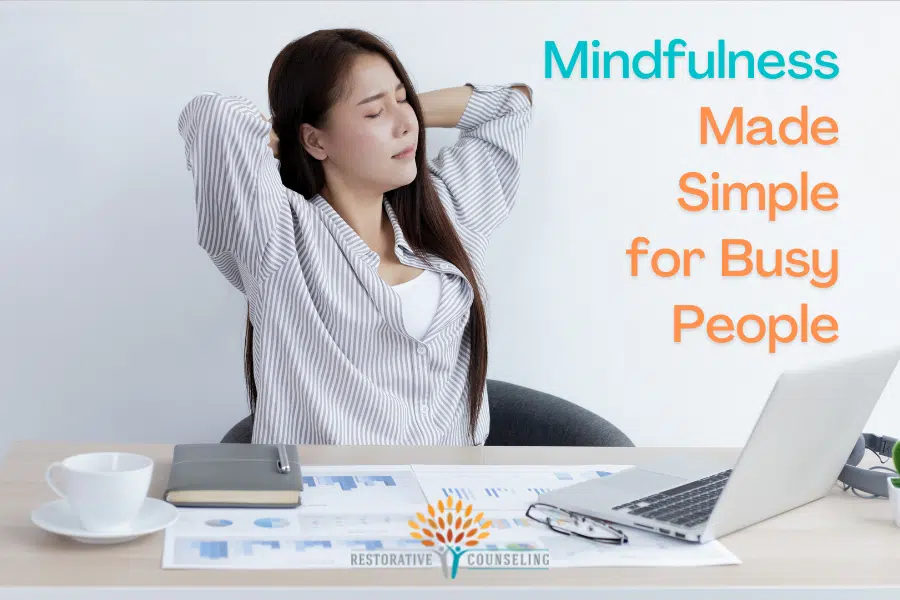Written by Jordan Meehan, LCSW
So often, mindfulness for busy people can feel inaccessible. Life can seem to be just “Go, go, go!” all the time, whether you are an employee of a company, a parent, a caretaker, or a student. Sometimes it can feel impossible to pause and take a break from the busyness. Try this out…
As you read this, think about your right foot. What is your foot touching? Does your foot feel warm, cool, or tingly? Now, gently push your foot into the floor.
- Notice the pressure on the bottom of your foot
- Observe any tension in your leg muscles as you push your foot into the floor
- Be aware of each toe and its’ contact point with the floor
You just successfully practiced mindfulness!
Defining Mindfulness
If you ask a person how they might define mindfulness, you will get a wide variety of answers. Some definitions might be very short and simple, while others are long and complex. People may say that mindfulness is about being aware of yourself and the present moment. Others may say it’s about being aware of others and your actions towards them. All are true! However, mindfulness can be boiled down to a very simple definition:
Paying attention.
Mindfulness is many things, not just meditation
You might consider yourself to be “too busy” to take the time you believe is necessary to experience mindfulness. Not uncommonly, people don’t fully understand what mindfulness is and whether it is realistic to practice. Here are some common misconceptions about mindfulness:
“Mindfulness doesn’t really do anything useful for me”
One of the biggest misconceptions about mindfulness is that you will experience intense, immediate gratification when practicing the skill for the first time. While you may experience some positive benefits immediately, the main benefits of mindfulness grow over time. The more you practice being mindful, the easier it becomes to identify your thoughts and feelings, recognize what your body needs, respond better to stressors, and interact effectively with others.
Mindfulness and meditation are the same thing
While meditation incorporates mindfulness, you do not need to meditate in order to be mindful. Mindfulness can be practiced in a wide variety of ways, none of which need to include meditation if that’s not your thing!
“I can’t meditate/ I am bad at meditation”
If you want to practice mindfulness by meditating, it’s important to remember that meditation is simply a structured time to practice paying attention to an identified subject, while tuning out distractions. At first, meditation often feels hard because the human brain is naturally distracted by random sounds and sensations. When you meditate regularly, it becomes easier to redirect your focus back to the identified subject. The only way to improve focus is to practice how to focus.
“I’m too busy”
Mindfulness can be practiced in any increment of time while you are moving about your day. While meditation might require anywhere from 5 minutes to an hour of your time, other mindful activities can take as little as a few seconds. Mindfulness is accessible to even the busiest of people.
“There are too many distractions to be able to focus”
This is the precise reason why mindfulness is so important! Mindfulness teaches you to be aware and focus better, despite life’s constant distractions. By practicing pausing and paying attention, you strengthen your brain’s ability to function more efficiently, particularly when busy.
These misconceptions often lead people to believe that mindfulness is either impossible or not worth their time. While a busy lifestyle is not necessarily bad, the stress that comes from being constantly busy can have negative effects on a person, their family, and their relationships. When not well-managed, stress can lead to burnout, anxiety, depression, sleep difficulties, and even self-esteem issues. How one spends their time can easily be driven by stress rather than one’s values. Mindfulness acts as the “pause button” during a busy day or a chaotic moment to help ensure that you are actively choosing how you use your focus and energy.
Find realistic ways to cope with the stress of your busy life.
Benefits of Mindfulness for Busy People
When you choose to engage in mindful activities, you help protect your mental health while increasing your ability to cope with stressors in your life. Mindfulness can help a person in many ways:
- Helps to lower stress and manage stress ongoing
- Creates balance for people with busy lifestyles
- Gets you back into your body when stressed or anxious
- Improves focus and concentration to allow for better time management
- Improves your ability to manage your reactions
- Helps with improving connections with others as a result of being more present when interacting
Simple Mindfulness Tips for Busy People
You can experience the vast benefits of mindfulness by finding ways that work for you to incorporate mindfulness into your life. The options are endless. Below are some examples of simple ways to incorporate mindfulness into your busy day.
- While brushing your teeth each morning, pay attention to the taste of the toothpaste and the sensation of the bristles on your gums.
- Notice the temperature and taste of your coffee or tea while enjoying a cup.
- When interacting with someone, place your phone out of reach/turn off your computer screen/close your laptop. Make eye contact with the person and focus on what they are sharing.
- Stand up and stretch for 30 seconds, while paying attention to the release of physical tension from your muscles.
- If you are struggling to focus and keep getting distracted, pause and look at the floor for a few seconds while noticing the textures, colors, etc. of the floor material.
- If you catch yourself daydreaming while working on a task, try to label any sounds you hear and then give yourself permission to return to your task.
- When walking somewhere, notice each footstep as your foot makes contact with the ground.
- In the evening after work, before you turn on the tv or start making dinner, sit down for 1 minute and observe/label how you feel.
- While taking a shower, notice the temperature and feeling of the water on your skin.
Try out some of these examples or come up with some of your own! Mindfulness can be a realistic practice for everyone, regardless of how busy a person is.
Restorative Counseling can assist you in finding realistic ways to incorporate mindfulness into your life
No matter how busy your life may be, there are ways to make mindfulness work for you and your lifestyle. Our clinicians can help you find your version of balance in your life and manage the stressors that come your way. To learn more and get started, schedule an appointment today.

Hi, I’m Jordan!
I partner with teens and adults to treat concerns related to trauma, anxiety, and relationships utilizing CBT, ACT, and EMDR approaches. Read more about me.
Follow Restorative Counseling
Sign up for our newsletter

